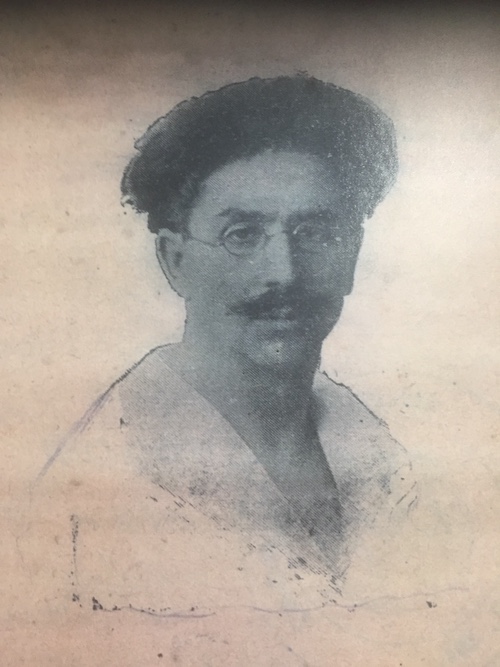Two Poems
by John Tripoulas
Cavafy’s Guest
Constantine Cavafy bragged to friends
admiring the view from the balcony
of his flat in Alexandria,
“Where could I live better?”
—with a brothel, a church, and a hospital
all a stone’s throw away?
Soon after he moved here,
he burned his early work,
and began writing anew
the ironic, history-laden poems
for which he is now remembered.
From this balcony he would have seen
a short, bespectacled doctor
walking with quick penguin steps
coming and going from the hospital.
This was my grandfather,
Dr. Demetrios Golemis,
who was also a Symbolist poet
and a medalist in the first Olympic games.
No one now knows if the two poets
met and talked about their work—
Cavafy showing him his poem
about the city, and perhaps
the ones about forbidden love,
while inwardly dismissing
the young Golemis, who also
might have read from his new book,
Pediments, published in Alexandria,
sharing with the older man
his short lyrics of sorrow
conveyed in images from nature,
and his longed for flight
to a far-away better world.
Toward the end of his life
old Cavafy, often unkempt,
wandered Alexandria’s Greek quarter
trying the fare at new cafes
and talking poetry and ancient history
with the young men who admired him,
until he could talk no more.
Stricken with throat cancer,
he wept on the way to the hospital
he saw each day from his balcony.
Golemis, always restless,
left Alexandria soon after
to resume his Odyssean adventures
throughout Magna Grecia
all the while caring for patients
and writing poems.
When he finally returned to Lefkada,
the island of his birth,
there was no Penelope waiting
or suitors to kill, only curious islanders
wondering why this doctor and poet—
“contemptuous,” as one Lefkadian wrote,
“of love and money,”
self-effacing and cracking jokes—
was playing cards with them.

Walking on Water in the Gardens of the Mind
Halfway between Constantinople and Gallipoli
lies Proikonyssion, Dowry Island,
now called Marmara
rising from the Marmara Sea.
Marmara, Greek for “shimmering,”
like the shimmering Marmara Sea,
also means “marble,”
quarried here since ancient times.
The shimmering stone was cut
to pave the floor of Saint Sophia,
its brilliant white with streaks of gray
a symbol of God’s primordial sea,
acheiropoieta, “not made by human hands.”
Rising from Saint Sophia’s watery floor,
no brilliant tesserae of saints and angels,
but refulgent marble slabs
quarried from every corner
of the empire’s realm:
Egypt’s purple porphyry,
verde antico from Thessaly,
Eubean cipollino,
pavonazetto mined in Docimium,
golden Numidian giallo antico,
stones of all colors and traits,
diverse as the flock of faithful
from every imperial domain;
they cover the church walls,
revetments, acheiropoieta,
with veins and markings—
Rorschach blots that come to life
as glorious gardens, flowering meadows,
miracles before the eyes of the devout,
standing on a sea of stone.
From 2009 until 2016 John Tripoulas served as the general
surgeon on the Greek island of Ikaria where his father and paternal
grandparents were born. John was born and raised in Cleveland, Ohio, U.S.A.
He was graduated from Oberlin College with a BA in English Literature and
subsequently received an MD from Athens University Medical School. His
maternal grandfather is the Lefkada island born poet and Olympic athlete
Demetrios Golemis whose poems John has translated into English in a volume
titled Demolished Souls (Cosmos Press, 2011). In 2016 John
published his first collection of poems A Soul Inside Each Stone
(Dos Madres Press). A bilingual edition of the book, the poems translated
into Greek by Socrates Kabouropoulos, was published by To Rodakio Press,
Athens, Greece. John currently works as a surgeon at Evangelismos Hospital,
Athens, Greece.
